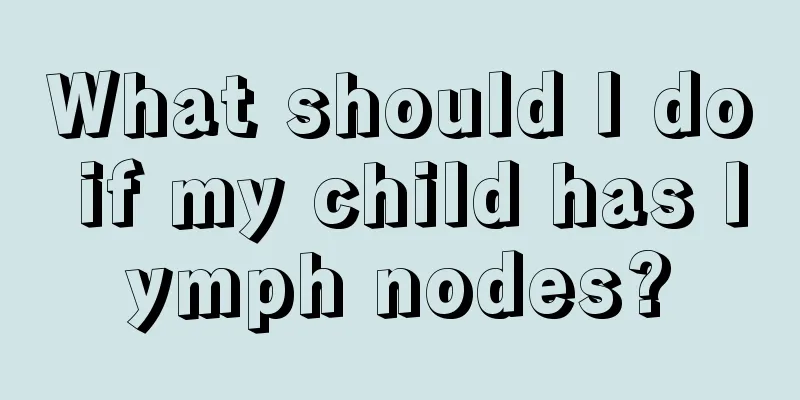What should I do if my child has lymph nodes?

|
Lymph nodes are very common in the human body and can help people resist external invasions, and children are no exception. However, lymph nodes are divided into two types: benign and malignant. People need to seek medical treatment in time and check which type they belong to. If it is benign, there is no need to worry too much, but pay attention to a regular life to avoid deterioration. If it is a malignant lymph node, special attention must be paid and active treatment must be received to restore health as soon as possible. 1. Lymph nodes There are lymph nodes all over the human body. These lymph nodes are like guards, helping us resist the invasion of foreign enemies. The lymph nodes have a union, which makes up a very important lymphatic system in the human body, which is the body's defense system against disease. The lymph node soldiers in different positions each receive orders and perform their duties to stand guard. When there are foreign viruses, bacteria and other enemies, the lymph node soldiers will play a role (clinically, the lymph nodes will swell and proliferate), enhance their combat effectiveness, and gather for battle. 2. Where are the lymph nodes distributed? Lymph nodes are widely distributed and are divided into superficial lymph nodes and deep lymph nodes. For example, in front of the ears, behind the ears, neck, back of the head, chin, the small depression above the collarbone, armpits, groin, mesenteric lymph nodes, etc. The lymph nodes located superficially on the skin are prone to swelling when the body is sick. The most common symptom in children is swollen lymph nodes in the neck, which is mainly caused by inflammation such as tonsillitis, dental caries, stomatitis, and rhinitis. 3. When will the child’s swollen lymph nodes subside? When some children are sick, such as with a cold, the lymph nodes controlling this area will swell. Some children get sick repeatedly, and their lymph nodes keep swelling, and this process continues until puberty. As we grow up, the lymph nodes will gradually shrink and become untouchable. 4. Do you need treatment? The lymph nodes are the size of soybeans or peanuts, are not itchy or painful, have a smooth surface and can slide, so there is no need to worry or treat them. If you give your baby cephalosporin or other drugs at this time, it would be considered an abuse of antibiotics. However, if the child's swollen lymph nodes grow quickly, become red and swollen, or are not smooth and have a hard texture a bit like stone, are fixed in position and do not slide, feel stuck together, are abnormally swollen and do not subside, and are accompanied by fever and night sweats, then the child needs to go to the hospital as soon as possible for further diagnosis and treatment. |
<<: Reasons why children don’t like to eat breakfast
>>: What medicine should children take for acute laryngitis
Recommend
Symptoms of gas in children
Hernia is a relatively common disease, and the in...
What kind of milk is good for one-year-old babies?
Babies need to drink breast milk after they are b...
How to prevent redness and swelling of joints in children?
Nowadays, not only the elderly are prone to arthr...
How to take care of a child with foreskin that is too long?
When many parents find that their children’s fore...
What should I do if my child has a fever and stomachache?
Generally, children have poor resistance and may ...
Can children use cooling oil?
Mosquitoes are easy to breed in summer, and babie...
What are the symptoms of high lead levels in children?
Lead is a heavy metal. If the lead content in a c...
What to do if your child refuses to go to school
Going to school is the most important activity fo...
What are the reasons for children's shaking hands and feet when sleeping?
Generally speaking, it is a normal physiological ...
What are the classifications of supracondylar humeral fractures in children?
Children are more active and have a strong curios...
What are the treatments for allergic cough in children?
When allergies occur, coughing is a very common s...
What are the first aid measures for children drowning in swimming?
Every summer vacation, we hear news of many child...
What causes children to have frequent headaches?
In life, many parents will enroll their children ...
A 10-year-old girl has a lump on one breast
Boys' testicles enlarge, girls' breasts b...
What should I do if my 18-month-old baby is zinc deficient?
If your 18-month-old baby is zinc deficient, you ...









